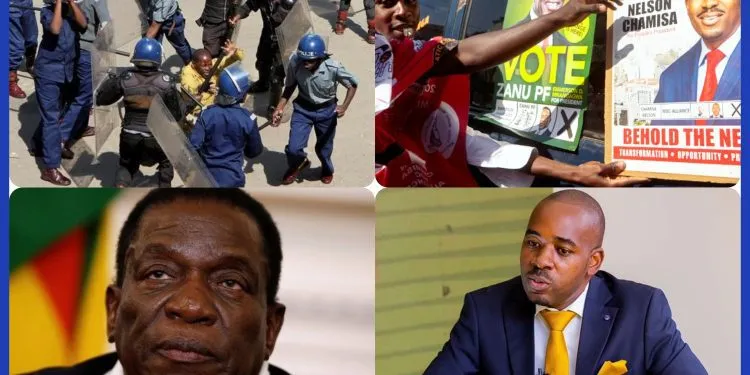Police in Zimbabwe have arrested at least 40 members of the leading opposition party, Citizens Coalition for Change (CCC), for “blocking traffic and disrupting order” during a campaign event on Tuesday, one week before the country votes in its national elections.
The CCC were campaigning in a southwestern suburb of the capital Harare when supporters were blocked by police, according to party spokeswoman Fadzayi Mahere.
Police alleged that the party notified local authorities that it would be a rally but then diverted from their allotted location. According to police, the group “went on a carry a rally procession” and stopped at a traffic light “openly blocking traffic”, while also “starting chanting party slogans and singing.”
Earlier this year, the CCC went to court to challenge a police decision to ban another political rally they wanted to hold in Bindura, a town north of Harare. The party claimed that this was “another example of how President Emmerson Mnangagwa’s administration is suppressing and stifling opposition ahead of elections.”
A few weeks later, Mnangagwa also signed into law the Criminal Law Codification and Reform Amendment Bill, 2022, commonly referred to as the “Patriotic Bill”, which further criminalised political rallies and citizen protests. This has added to the tension between the government and opposing parties as well as fears that this upcoming election may be rigged.
The president seeks reelection.
Zimbabwe’s presidential and preliminary elections are scheduled for Wednesday, August 23. Mnangagwa, who is seeking reelection, will face off with CCC party leader, lawyer, and pastor Nelson Chamisa, 45. Mnangagwa, 80, was first elected president in 2018 after a military coup led to the resignation of former leader Robert Mugabe in 2017.
The main platforms of both the CCC and the ruling party, ZANU-PF, have been focused on the growing financial crisis in the country, with Chamisa blaming Mnangagwa’s government for the growing corruption and economic mismanagement. The government has refuted this, instead blaming Western sanctions for the country’s crisis and failure to forgive its growing foreign debt.
Concerns over the electoral process
After Mnangagwa announced the upcoming election date back in May of this year, Chamisa’s party demanded access to audit the voter rolls as well as public media access. Which they said would help “level the playing field ahead of the polls.” The government refused to comply, prompting many local and international political commentators to agree that without election reforms, the country would most likely see another heavily disputed election.
Also, the current government recently stopped an ex-minister from contesting in the polls, sparking criticism that Mnangagwa was stifling the democratic processes in the country.
There are also fears that it could turn violent if Mnangagwa is declared the winner, as it did when he began his first term in 2018. Which saw members of the army shoot and kill multiple protesters after they said that the election was rigged.
Human Rights Groups React
Commentators and citizens are not the only ones who share in the concern, multiple human rights organizations in the country have come out to condemn the situation as well as the use of excessive force by police to intimate voters. The Zimbabwean police have been known to use tear gas, water cannons, and live ammunition to suppress crowds.
A report by Human Rights Watch this month said the upcoming ballot will be held under a “seriously flawed electoral process that does not meet global standards for freedom and fairness.” They also accused the police of “partisan conduct” and of using “intimidation and violence against the opposition”.
The International Republican Institute (IRI) also released a report similar to Human Rights Watch, in part writing, “Zimbabwe’s political landscape has a troubling history of offline violence, especially around elections. The country’s security forces, backed by ZANU-PF, have consistently engaged in acts of unlawful violence, exhibiting a sense of impunity. These acts often result in police brutality and further victimisation of vulnerable groups.”
Khanyo Farisè, Amnesty International’s Deputy Director for Southern Africa, also had this to say: “What we have seen in Zimbabwe over the past five years amounts to a brutal crackdown on human rights, especially the rights to freedom of expression, peaceful assembly, and association.”



